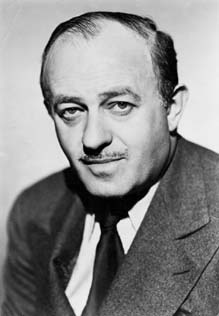Background
The son of immigrants from Minsk, Russia, he was born in New York and grew up in Racine, Wisconsin. Four crates of books given to him by his father on his bar mitzvah turned him into an avid reader.


The son of immigrants from Minsk, Russia, he was born in New York and grew up in Racine, Wisconsin. Four crates of books given to him by his father on his bar mitzvah turned him into an avid reader.
At age sixteen, he drifted into journalism in Chicago and from 1918 to 1920 was a foreign correspondent in Germany. Returning to Chicago, he founded and edited the Chicago Literary Times from 1923 to 1925. It was at this time that Ezra Pound wrote, “Why should I come back to that God-forsaken desert; there is only one intelligent man in the whole United States to talk to — Ben Hecht.”
In the 1920s Hecht wrote several of his eleven novels. His early depiction of Jews, as in "A Jew in Love" (1930), is unsympathetic. He had his first real success in Hollywood. Lured to Paramount by his friend Herman J. Mankiewicz, Hecht, partly out of frustration at the limitations placed on sympathetic characters in the films of his time, wrote a script peopled exclusively by villains.
In all he was to work on 150 films, many of them uncredited, earning, in his words, “tremendous sums of money for work that required no more effort than a game of pinochle.”
He was the first Hollywood writer to earn a thousand dollars a day. He wrote another seminal gangster film, "Scarface" was a coauthor of the Marx Brothers’ "Monkey Business", and among the other classics on which he worked were "Stagecoach", "Gone with the Wind", "Wuthering Heights", and three Hitchcock movies, "Spellbound", "Notorious", and "Rope".
The rise of Nazism affected him deeply and he devoted himself increasingly to Jewish activism. His “Remember Us,” first staged as a pageant in Madison Square Gardens and then published in the American Mercury was the first article in a major American journal to call attention to the Nazi genocide of the Jews.
A delegation from Palestine persuaded him to head the League for a Free Palestine, the American propaganda and fund raising arm of the Irgun, the Jewish underground in Palestine. Hecht became similarly involved in the Hebrew Committee of National Liberation, which had similar aims. He wrote a pageant called "A Flag is Born", performed 120 times in New York, which raised a million dollars, used to buy a former German cruise boat. It was renamed the Ben Hecht and sailed to Palestine with Jewish refugees but was stopped by the British and the refugees transferred to internment in Cyprus.
Quotations: In 1947 he placed a full-page advertisement in fifteen American newspapers praising the Jewish underground for its attacks on the British in Palestine, writing: “Every time you blow up a British arsenal, or wreck a British jail, or send a British railroad train sky high, or let go with your bombs and guns at the British invaders of your homeland, the Jews of America make a little holiday in their hearts.”
